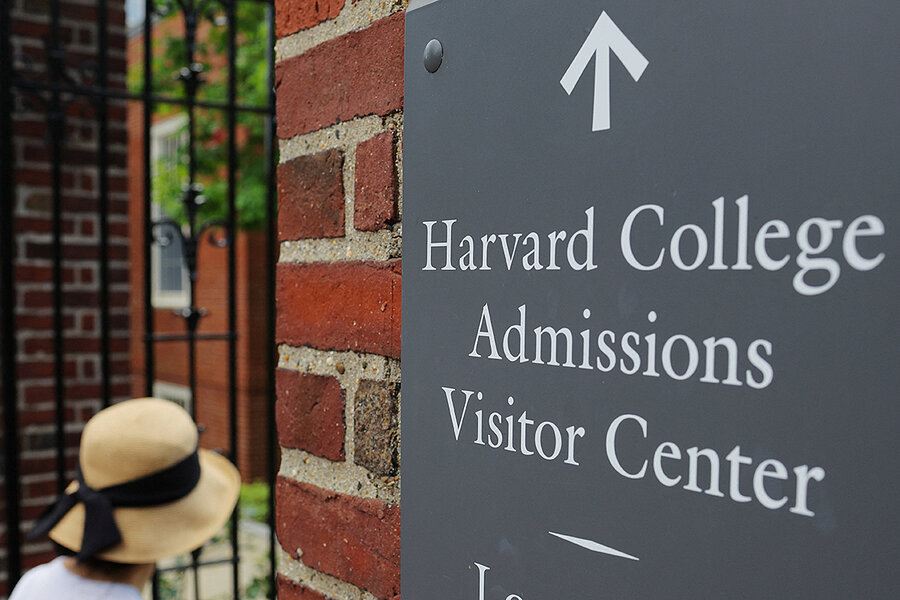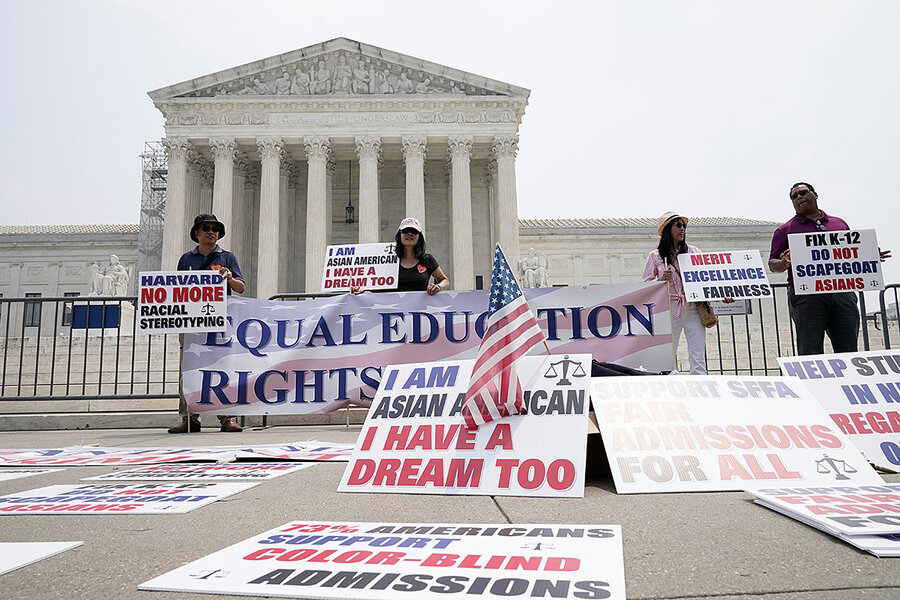With affirmative action gone, a new target: Legacy admissions
Loading...
The practice at many colleges and universities of giving preferred admission status to the children of alumni and donors is coming under scrutiny, propelled in part by the U.S. Supreme Court’s decision to strike down affirmative action in June.
A complaint was filed earlier this month to the U.S. Department of Education by lawyers representing three groups – Chica Project, African Community Economic Development of New England, and Greater Boston Latino Network – that want to see legacy admissions banned at Harvard.
Why We Wrote This
A story focused onWhat will make college admissions more equitable? Now that affirmative action has been struck down by the U.S. Supreme Court, other practices, such as legacy admissions, are under scrutiny.
On July 19, Wesleyan University in Connecticut and the University of Minnesota Twin Cities became the latest institutions of higher learning to drop legacy admissions. Research shows that the American public casts a skeptical eye on the practice, with 75% of respondents telling the Pew Research Center in 2022 that legacy status should not be a factor in admissions.
Irving Joyner, a professor of law at North Carolina Central University, says he thinks the challenge against legacy admissions has merit.
“When you look at the numbers, the numbers support the predominant use of that device to benefit white applicants,” he says. “And where you are doing that to benefit a segment of the population to the exclusion of others who don’t have those external connections, then you are discriminating against people.”
If race-based admissions at Harvard must go, legacy privileges must go, too.
That is the sentiment of a complaint to the U.S. Department of Education by lawyers representing three groups: Chica Project, African Community Economic Development of New England, and Greater Boston Latino Network.
The practice at many institutions of higher learning of giving preferred admission status to the children of alumni and donors is coming under scrutiny, propelled in part by the United States Supreme Court’s decision to strike down affirmative action in June. On July 19, Wesleyan University in Connecticut and the University of Minnesota Twin Cities became the latest institutions of higher learning to drop legacy admissions. The American public casts a skeptical eye on the practice, with 75% of respondents telling the Pew Research Center in 2022 that legacy status should not be a factor in college admissions.
Why We Wrote This
A story focused onWhat will make college admissions more equitable? Now that affirmative action has been struck down by the U.S. Supreme Court, other practices, such as legacy admissions, are under scrutiny.
“The Supreme Court’s decision obviously heightens the urgency now of removing these unfair barriers to applicants of color. That conversation has accelerated now, and we fully expect that Harvard one day will be forced to voluntarily give up those unfair preferences,” says Oren Sellstrom, litigation director for Lawyers for Civil Rights, a Boston-area legal advocacy organization.
The complaint was filed on July 3 to the Education Department’s Office for Civil Rights by Mr. Sellstrom’s group, which helps people of color and immigrants who face discrimination and seek equity. It comes on the heels of the Supreme Court striking down race-based admissions earlier in the summer as violating the U.S. Constitution.
A majority of Americans, 52%, support the high court’s decision, according to an ABC/IPSOS poll done in early July. Previous bans on affirmative action in states such as California and Michigan resulted in as much as 50% fewer students of color on campuses.
The legal complaint comes after Harvard was forced to turn over admissions and enrollment data during the Supreme Court review. Mr. Sellstrom says that data proves what many believed for a long time: White students disproportionately benefit from legacy status.
How big a boost?
Studies showed that 43% of white students admitted to Harvard were either legacies, athletes, or children of parents or relatives who have donated to the university. And some 70% of the university’s legacy students are white.
“Harvard University will not comment on the complaint,” senior communications officer Nicole Rura writes via email. “As we said, in the weeks and months ahead, the University will determine how to preserve our essential values, consistent with the Court’s new precedent.”
In the June decision in Students for Fair Admissions v. Harvard, Justice Neil Gorsuch wrote that legacy admissions were “no help to applicants who cannot boast of their parents’ good fortune or trips to the alumni tent all their lives. While race-neutral on their face, too, these preferences undoubtedly benefit white and wealthy applicants the most.”
Schools deciding to do away with legacy admissions is not new. Amherst College banned legacy admissions in 2021. Johns Hopkins University began the process to abolish them in 2009, and the Massachusetts Institute of Technology has a long-standing policy against legacy admissions. The state of Colorado banned legacy admissions in public universities in 2021 – the first state to take that action. Others, such as New York and Connecticut, have broached the issue but have not gotten traction. Some schools have said that allowing legacy admissions is a fundraising tool and helps them stay financially solid, but critics like Mr. Sellstrom say the evidence doesn’t support that.
In schools that have moved away from legacy admissions, “none have experienced that kind of [economic] fallout and in many cases have become financially better off now that they are admitting based on merit and not these unfair preferences,” he says.
Among students with the same SAT or ACT scores, those from families in the top 1% of income – making more than $611,000 a year – were 55% more likely to be admitted to highly selective private colleges than middle-class students, according to a study released Monday by Opportunity Insights, a group of Harvard economists who research inequality. The economists said that some 46% of that advantage could be attributed to legacy admissions.
“Legacy students from families in the top 1% are 5 times as likely to be admitted as the average applicant with similar test scores, demographic characteristics, and admissions office ratings; legacy students from families below the 90th percentile are 3 times as likely to be admitted as peers with comparable credentials,” the group concluded.
“Clearly, legacy has always been used to support this notion of white superiority and the entitlement of whites to be in the institution, irrespective of what kind of qualifications that they bring,” says Irving Joyner, a professor of law at North Carolina Central University’s School of Law.
“I agree with the challenge,” Professor Joyner continues. “I think there’s a legal basis for it. If you say that race or proxy for race violates the equal protection clause, then both the direct use of race or the direct use of a proxy for race, which would be legacy, should meet the same fate.”
“Uncharted territory”
During discovery for the Students for Fair Admissions case, Harvard released data on its admittance process and legacy statistics that researchers and lawyers had sought for years. However, some legal experts don’t think the data necessarily supports the plaintiffs’ assertion that legacy admissions must go.
“I would say it’s uncharted territory. It’s a novel legal claim, and there’s a lot of uncertainty about how courts will treat this claim,” says Thomas Berry, a research fellow in the Cato Institute’s Robert A. Levy Center for Constitutional Studies.
Lawyers for the three groups have several hurdles to jump over, says Mr. Berry, editor-in-chief of the Cato Supreme Court Review.
“I read the complaint and I don’t think there’s enough there to know for sure whether they’re correct. I think we’re going to need more discovery, where you take a deep dive into these admissions statistics and you essentially compare,” Mr. Berry says.
The complaint references Title VI of the 1964 Civil Rights Act, which prohibits race-based discrimination, so plaintiffs would need to prove that white students were disproportionately benefiting from legacy and donor status.
The second hurdle that would need to be cleared is if it could be proved that Harvard was discriminating intentionally, which would be hard to prove, Mr. Berry says. The federal government gives wiggle room for intent not specifically spelled out, he says, but whether that regulation is an accurate enforcement of the text is an open question.
Lastly, Harvard could still win if it showed that there was a legitimate educational basis, Mr. Berry says.
“Harvard might argue, for example, that this helps create a sense of community, that having students whose parents went there helps pass on traditions or helps make the community more tightknit or ensures that the university can remain independent,” he says. The independent part of that equation specifically refers to finances, which would require less financial dependency on the federal government.
“Harvard could still make some arguments,” he says, “but quite frankly if it gets to this stage, I think this is where the challenge is mostly likely to win.” In his opinion, if it gets this far, he doesn’t see Harvard having strong justification to keep legacy and donor admissions.
Dan Blumenthal is a Boston-area cardiologist and Harvard legacy. His father graduated from Harvard and later taught at the medical school. Dr. Blumenthal – who holds a bachelor’s degree, medical degree, and MBA from Harvard – doesn’t want legacy admissions to go away.
“I don’t remember if they had a box to check when I applied, but if they did, I would have checked it,” says Dr. Blumenthal, who says that being a legacy was something that added more pressure on him to make sure that he excelled in school. While an undergrad more than 20 years ago, he knew other legacy students who performed at a high level and went on to be successful in many different fields, and he feels that their acceptance to Harvard was based on merit.
“I can talk about my own personal experience. I would want to know that I had performed at a level that was worthy of being admitted to a college like Harvard, without having legacy status be the arbiter of my ability to get admitted. But I still believe that legacy status should be factored into admissions in certain circumstances,” Dr. Blumenthal says.
“And also that race and ethnicity and life experience that flows from this diversity should be factored into admissions decisions,” he continues. Dr. Blumenthal says that he disagreed with the recent Supreme Court decision overturning affirmative action and that things should have stayed the way they were. He also says that he doesn’t think legacy status should go away as a result of that decision.
“Two wrongs don’t make a right,” he says. “Just because one policy is bad doesn’t mean that you should make additional bad policy just for consistency.”
Mr. Sellstrom says that the federal government does not accept financial reasons as justification for discriminatory practices, unless an educational necessity can be proved. He is waiting to see the investigation’s outcome while pondering further legal action.
Professor Joyner, who says that he thinks the challenge has merit, is also waiting.
“When you look at the numbers, the numbers support the predominant use of that device to benefit white applicants,” he says. “And where you are doing that to benefit a segment of the population to the exclusion of others who don’t have those external connections, then you are discriminating against people.”










